2024中考英语二轮复习之代词精讲及配套练习课件(共35张PPT)
文档属性
| 名称 | 2024中考英语二轮复习之代词精讲及配套练习课件(共35张PPT) |  | |
| 格式 | pptx | ||
| 文件大小 | 489.4KB | ||
| 资源类型 | 教案 | ||
| 版本资源 | 通用版 | ||
| 科目 | 英语 | ||
| 更新时间 | 2024-01-04 14:03:39 | ||
图片预览

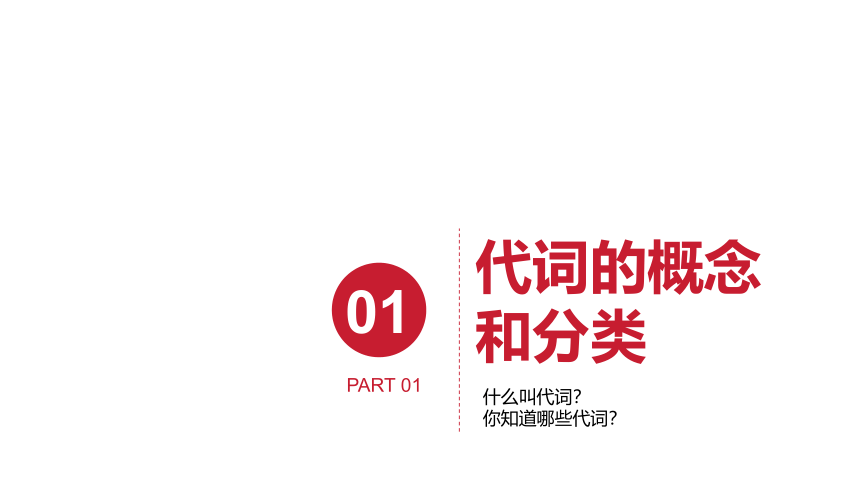
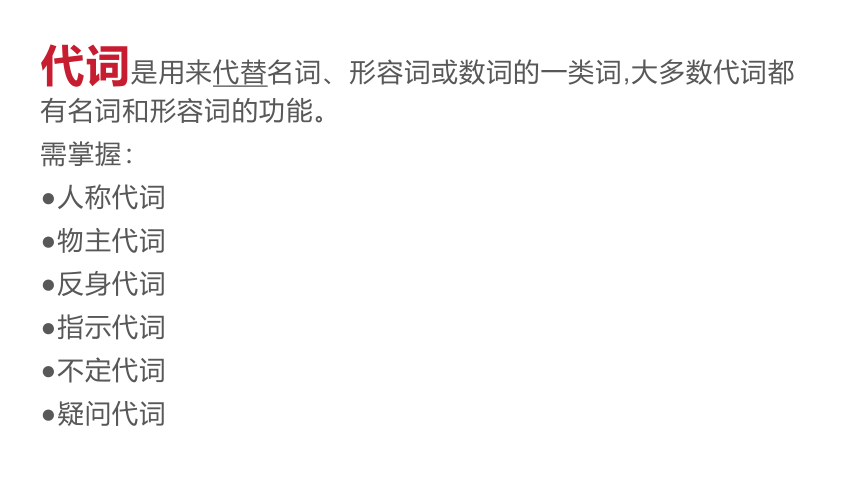
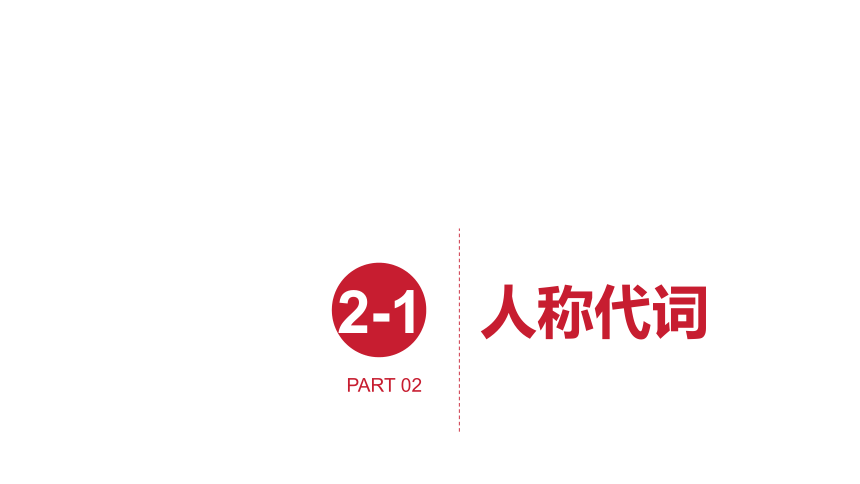
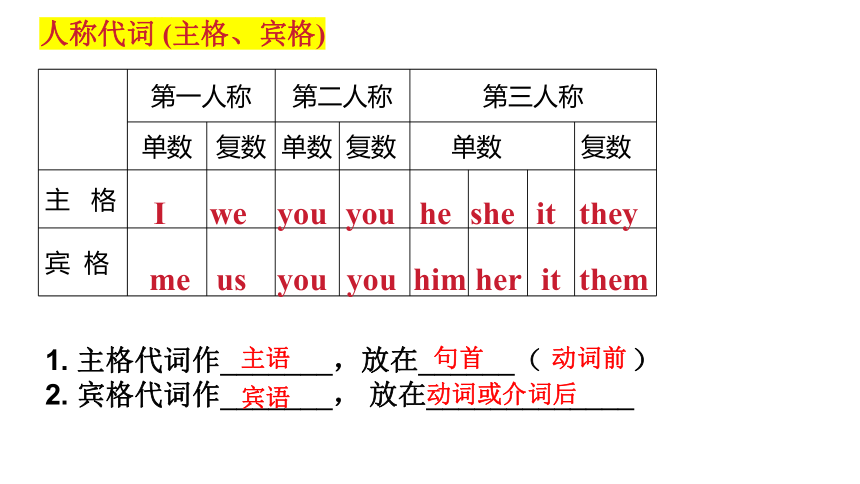
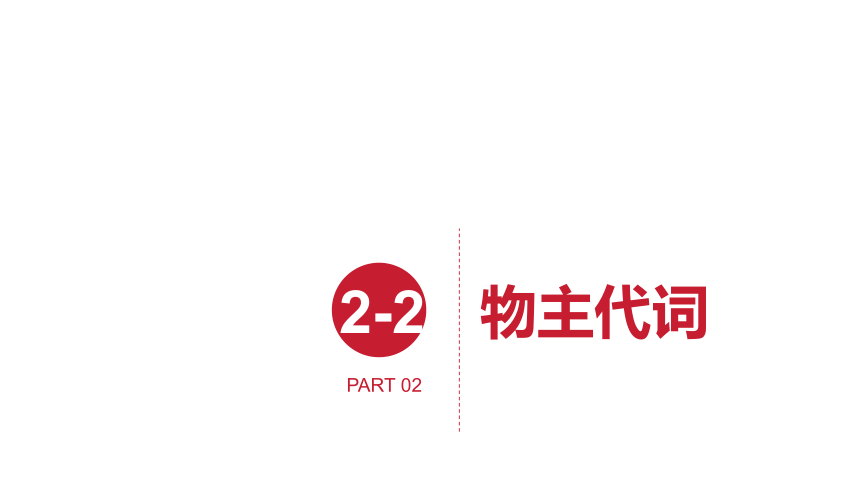
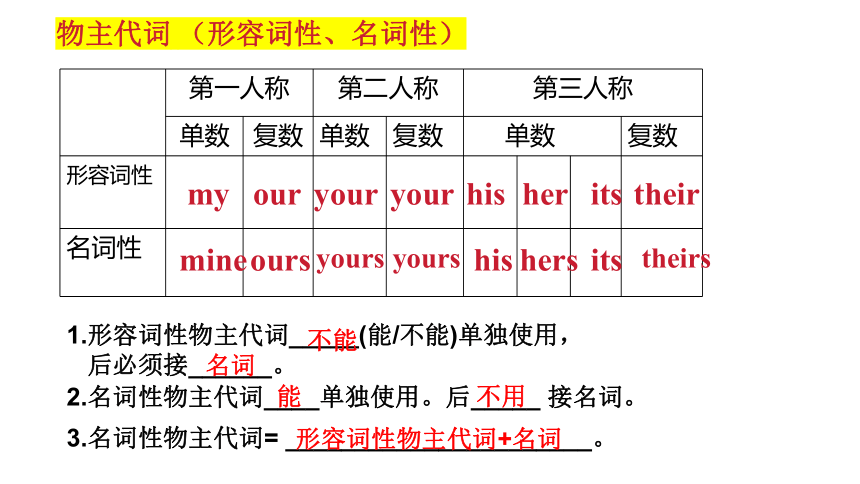
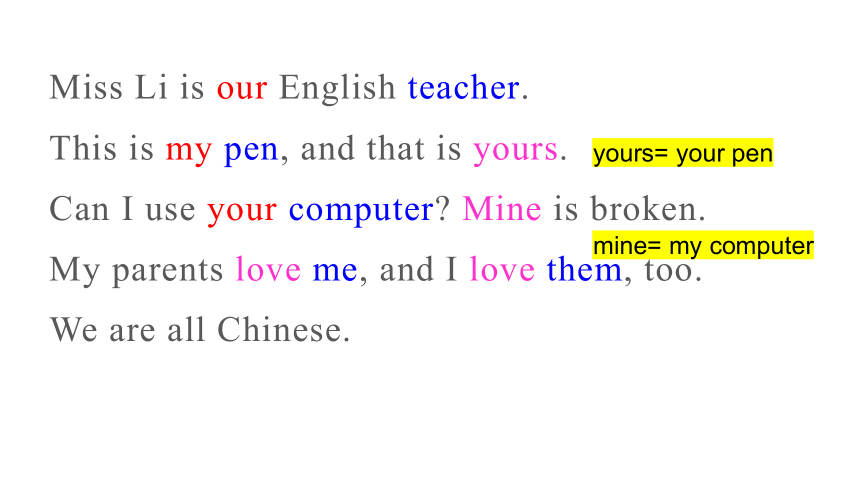
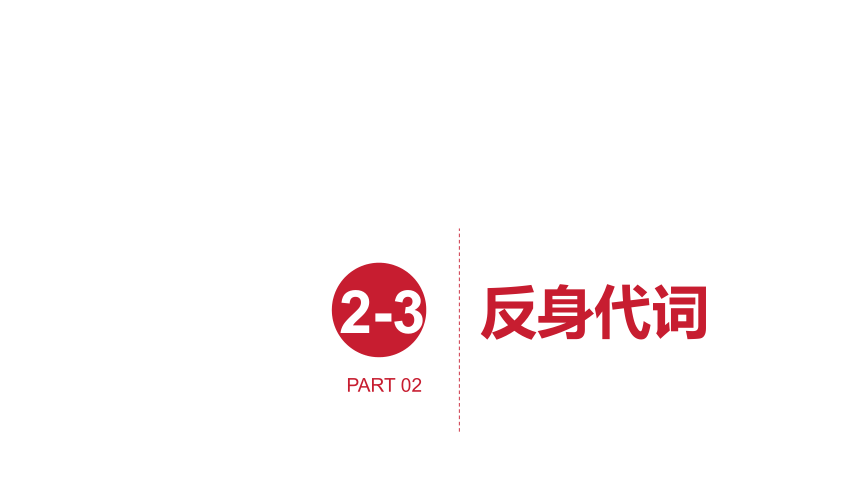
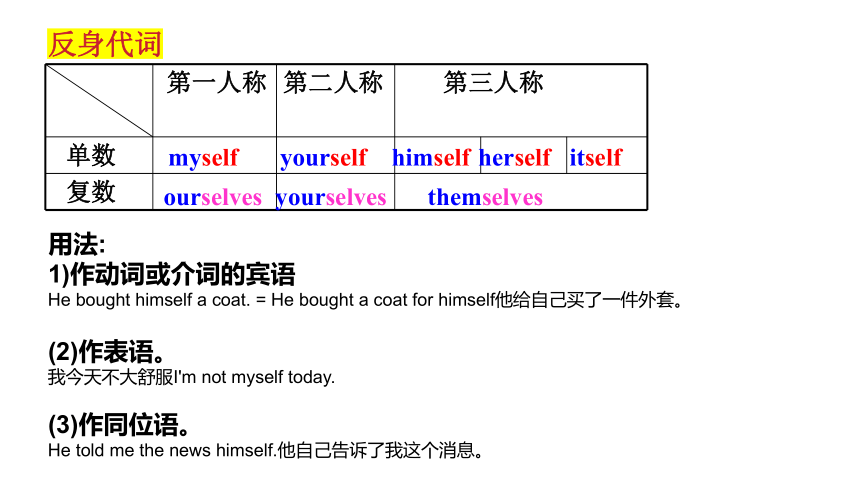
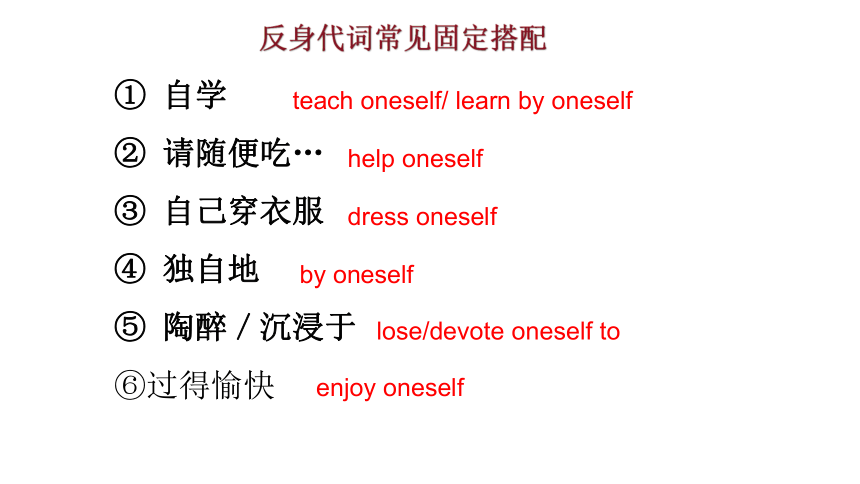
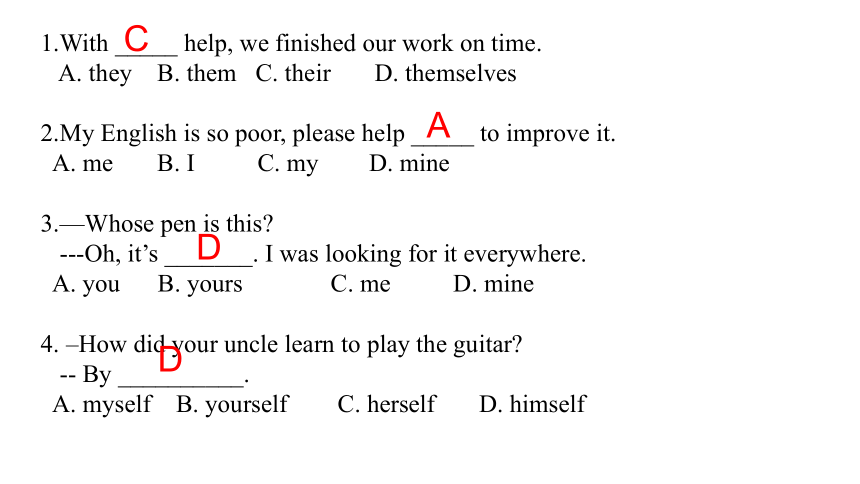
文档简介
(共35张PPT)
代 词
代词的概念和分类
PART 01
什么叫代词?
你知道哪些代词?
01
代词是用来代替名词、形容词或数词的一类词,大多数代词都有名词和形容词的功能。
需掌握:
人称代词
物主代词
反身代词
指示代词
不定代词
疑问代词
人称代词
PART 02
2-1
第一人称 第二人称 第三人称 单数 复数 单数 复数 单数 复数
主 格
宾 格
人称代词 (主格、宾格)
I
we
you
you
he
she
it
they
me
us
you
you
him
her
it
them
1. 主格代词作_______,放在______( )
2. 宾格代词作_______, 放在_____________
主语
句首
动词前
宾语
动词或介词后
物主代词
PART 02
2-2
第一人称 第二人称 第三人称 单数 复数 单数 复数 单数 复数
形容词性
名词性
物主代词 (形容词性、名词性)
my
our
your
your
his
her
its
their
mine
ours
yours
yours
his
hers
its
theirs
1.形容词性物主代词_____(能/不能)单独使用,
后必须接______。
2.名词性物主代词____单独使用。后_____ 接名词。
3.名词性物主代词= ______________________。
不能
能
名词
形容词性物主代词+名词
不用
Miss Li is our English teacher.
This is my pen, and that is yours.
Can I use your computer Mine is broken.
My parents love me, and I love them, too.
We are all Chinese.
yours= your pen
mine= my computer
反身代词
PART 02
2-3
反身代词
第一人称 第二人称 第三人称 单数
复数 myself
ourselves
yourself
yourselves
himself
themselves
herself
itself
用法:
1)作动词或介词的宾语
He bought himself a coat. = He bought a coat for himself他给自己买了一件外套。
(2)作表语。
我今天不大舒服I'm not myself today.
(3)作同位语。
He told me the news himself.他自己告诉了我这个消息。
自学
请随便吃…
自己穿衣服
独自地
陶醉/沉浸于
过得愉快
反身代词常见固定搭配
enjoy oneself
teach oneself/ learn by oneself
help oneself
dress oneself
by oneself
lose/devote oneself to
1.With _____ help, we finished our work on time.
A. they B. them C. their D. themselves
2.My English is so poor, please help _____ to improve it.
A. me B. I C. my D. mine
3.—Whose pen is this
---Oh, it’s _______. I was looking for it everywhere.
A. you B. yours C. me D. mine
4. –How did your uncle learn to play the guitar
-- By __________.
A. myself B. yourself C. herself D. himself
C
A
D
D
1.Today we are proud of our school, and tomorrow our school will be proud of ______.(we)
2. Let _______ try, and I will understand. (I)
3. I lost __________ in the beautiful music. (I)
4. A teacher, like bright sunshine, lights up the morning life; like a river, take _____ to the sea of knowledge. (we)
5. As middle school students, we should depend on ____________in life. (we)
6. Parents are our first teachers. They teach lessons of life. (we)
us
me
myself
us
ourselves
us
指示代词
PART 02
2-4
指示代词it
1. 代替指示代词this或that —What’s that —It is a pencil.
2. 指代动物、婴儿或不明性别、身份的人。以及谈话的双方都知道的人或事。
3. 指代时间/季节/天气 —What’s the time now —It’s ten o’clock.
4. 指代距离 How far is it from your school to your home
5. 常用句型
1) 到了该做某事的时间了________________
[e.g. 到了吃晚饭的时间了。_______________________________]
2) 作形式主语
① it’s adj+for/of sb to do [e.g. 我们有必要学好英语。___________________________________]
② it takes/ took sb. sth. to do sth. [e.g.我花了两小时做作业。________________________________]
3) 作形式宾语
主+谓v +it+ adj. + to do sth. 常用it作形式宾语的动词:think, consider, find, feel, make
[e.g. 我觉得学好英语很有必要。________________________________________]
It’s time to do sth
It’s time to have lunch
It’s necessary to learn English well.
It takes me 2 hours to do homework.
I think it necessary to learn English well.
不定代词
PART 02
2-55
不定代词指无法精确指明所要代替的名词,所指代的名词很模糊
普通不定代词 some, any, no, one...
个体不定代词 all, each, every, both, either, neither, another, other ...
数量不定代词 few, a few, little, a little, many, much...
【用法】
1.肯定句用some;否定句、疑问句用any。
2. some可用于表示请求、建议的句型中,表示希望得到对方肯定的答复。
Will you please get some eggs for me, Mary 玛丽,你能给我一些鸡蛋吗
Shall we buy some bananas 我们要买一些香蕉吗
普通不定代词 some, any, no...
个体不定代词
every与each的区别
each every
①可单独使用 ①不可单独使用
②可作代词、形容词 ②仅作形容词
③着重“个别” ③着重“全体”
注意:
当我们说each child/ each student,我们想到的是一个人的情况。
例:Each student has an English book.每个学生都有一本英语书。(强调个体)
而当我们说every child和every student,我们想到的是全体的情况。谓语动词用单数。
例:Every student is here, let’s begin our lesson.学生们都来了,我们开始上课吧。(强调整体)
each既可用作形容词,又可用作代词,在句中可以作定语,主语、宾语、同位语、状语等。例如:
1.Each student has his own dictionary .
2.Each has his good point.
3.Our headteacher had a talk with each of us.
4.The students each have a desk.
5.The children can have a bag each.
(形容词,定语)
(代词,主语)
(代词,宾语)
(代词,同位语,不影响谓语动词的单复数)
(副词,状语)
句子成分名词解释
1. 主语:句子所陈述的对象。
2. 谓语:主语发出的动作。一般是有动作意义的动词。
3. 宾语:分为动词宾语和介词宾语,属于动作的承受者。
4. 系动词: 表示状态或状态变化的动词,没有实际的动作意义。
如 be动词(is, am, are), 感官系动词(look, sound, smell, taste 和 feel)、
保持类系动词(keep, stay 和 remain)、状态变化类系动词(become、get、turn 和 go)等。
5. 表语:紧跟系动词后面的成分。
6. 定语:修饰名词或代词的成分。
7. 状语:修饰形容词、副词、动词或句子的成分。
8. 补语:分为宾语补足语和主语补足语。是对宾语和主语的补充说明,与其有主动/被动的逻辑关系。
如:You should keep the room clean and tidy. 你应该让屋子保持干净整洁。
(You是主语, should keep是谓语,the room是宾语,clean and tidy是宾语补足语。)
9. 同位语:通常紧跟在名词、代词后面,进一步说明名词、代词情况的成分。
如:We Chinese people are brave and hard-working. (Chinese people是We的同位语,关系紧密)
1.another 强调在三个或三个以上的“又一个,另一个”。
例:I don’t like this T-shirt.Would you like to show me another one
我不喜欢这件T恤。你能再给我拿一件看看吗
2.other+名词复数=others。
例:Some are cleaning the windows, other students are sweeping the floor.
Some are cleaning the windows, others are sweeping the floor.有些在擦窗户,有些在擦地。
3.one..., the other... (范围为两个中的) “一个……另外一个……”。
例:I have two bags.One is red, the other is blue.我有两个书包。一个是红色的;另一个是蓝色的。
4.some..., others... “一些……其他的(并非全部)……”,在一定范围里泛指有些……,有些……。
例:There are many children in the park.Some are playing games,others are reading books.
公园里有许多孩子,有些在做游戏,有些在看书。
5. some..., the others... “一些……剩余的(全部)……”,在一定范围里指有些……,剩余的(全部)……。
例:There are ten teachers in the office, five teachers are men teachers, the others are women teachers.
办公室里有十名老师,五名是男老师,剩余的都是女老师。
个体不定代词
other,the other,another,others,the others的区别
个体不定代词
all,none,either,neither和both的用法
含义 范围 语气 相关搭配 谓语动词
(做主语时)
both 两者都…… 两个 表肯定 both...and...
neither 两者都不…… 两个 表否定 neither...nor...
neither of
either 两者之中任何一个 两个 表肯定 either...or...
either
all 全都 三者或三者以上 表肯定 all of
none 没有一个 三者或三者以上 表否定 none of 1. Both his father and mother are teachers.
2. Neither his father nor mother is teachers.
Neither Jack nor I am a girl.
Neither of them drinks coffee.
3. Either he or his brother is going to London.
Either he or you are a student.
复数
就近原则
单数
就近原则
单数
主要看名词
/看语境
4. All sugar is sweet.
All plants need water.
All is silent. 万籁俱寂(指现象)
All are silent. 人人都沉默不语(指具体的人)
5. None of this money belongs to me.
None of us are tired.
None of them has/have come back yet.
数量不定代词
many和much的用法
相同点 不同点
many 都表示“许多”的意思 后面跟可数名词
much 后面跟不可数名词
例如:I have many books.
There is much water in the bottle.
数量不定代词
few,a few,little,a little在用法上的区别
用法 表示肯定 表示否定
复数可数名词 a few虽少,但有几个 few不多,几乎没有
不可数名词 a little虽少,但有一点 little不多,没有什么
例如:
He was unhappy because he made a few mistakes in the exam.
There were few people in the street because it was very cold.
He has so little money that he can't afford the book.
—Can I talk to you for a minute.Tom
—sure,I have a little time.
他因为在考试中犯了一些错误,所以不开心。
因为天太冷了,大街上没有什么行人。
他的钱太少,买不起这本书。
当然可以了,我有时间。
疑问代词
PART 02
2-65
含义 用法
who 谁 问人(主格)
whom 谁 问人(宾格)
whose 谁的 问所属关系(所有格或物主代词)
what 什么 问事件或东西
which 哪一个 问确切的哪一个事件或东西
Who is going to come here tomorrow 明天谁会来这?
What is that 那是什么?
Whose umbrella is this 这是谁的伞?
Whom are you waiting for 你在等谁?
(作宾语)
(作定语)
(作表语)
(作主语)
练习巩固
PART 03
03
1. We're busy because we have so_________ housework to do today.
A.few B. little C. many D. much
2. I don't understand the story though there are________ new words in it.
A. few B. little C.a few D. a little
3.--Excuse me,I want to buy some milk. Where can 1 find a supermarket
--Oh, I know ________ not far from my home.
A.it B. that C. one D./
4. When I returned to my hometown. I was nearly lost. Almost_______ had changed.
A. nothing B. anything C. something D. everything
5. --The books are so nice, which one can I take
--Oh, you can take_________ of them, I'll keep none.
A. both B. all C neither D. either
6. Mike's idea is different from________ .We really can't agree with_____.
A. ours; him B. ours;he's C. us;him D. us;his
7.--How many apples did your mother give you --_________.
A. One more B. Each one C. One everyone D. One each
8. Have you got ________to say about your daughter
A. anything else B. else anything C anything other D. other anything
9. --Can you come on Monday or Tuesday
--I'm afraid__________ day is possible.
A. neither B. either C some D. any
10. There is__________ knocking at the door. Go and see who it is.
A. nobody B. somebody C. anybody D. everybody
1. _____of us went to see the film because we had money to buy tickets yesterday.
2. Ton and his father are _____at work now .
3. _____ of the two is right .
4. He is taller than _____ _____ student in his class .
5. Some students like pop music while _____don't in their school.
6. --This is my dictionary . Where is _____(你的)?
7. The little boy is too young to look after _____(他自己)
8. _____(who)book is this
9. --Would you like _____(一些)apples --Yes , please.
10. Either you or I ___(be) going to America.
11. --Is there _____ in the cup 杯子里有东西吗?
--No, there is _____ 没有,什么也没有。
None
both
Either/Neither
any other
others
yours
himself
Whose
some
am
anything
nothing
It is reported that six men have been trapped in a mine for seventeen hours. If they are not brought to the surface soon, they__1__ lose their lives.
However, rescue operations are thought to be difficult. __2__ explosives(炸药) are used, it will make the mine shake and the roof will fall down. Rescue workers are therefore drilling(钻) a hole __3__ the north side of the mine. They plan __4__ the men up in a special small container. If there had not been a hard layer of rock beneath __5__ soil, they would have finished the rescue in a few hours. But the truth is, they have been drilling for sixteen hours and they still have a __6__ way to go. So, how to keep the men trapped alive for such a long time __7__ another difficult problem. But luckily, a good idea __8__: a microphone which was lowered into the mine two hours ago, has enabled the men to keep in touch with __9__ closest relatives. Though they are running out of food and drink, the men are cheerful and confident that they will get out soon. They have been told that rescue operations are progressing smoothly. If they knew __10__ difficult it was to drill through the hard rock, they would lose heart.
So, when people are in danger. Keeping them in a good spirit will be very helpful.
1. A.must B.should C.may D.can
2. A.If B.When C.Because D.Though
3. A.in B.on C.at D.over
4. A.bringing B.bring C.to bring D.to be bring
5. A.the B./ C.a D.an
It is reported that six men have been trapped in a mine for seventeen hours. If they are not brought to the surface soon, they__1__ lose their lives.
However, rescue operations are thought to be difficult. __2__ explosives(炸药) are used, it will make the mine shake and the roof will fall down. Rescue workers are therefore drilling(钻) a hole __3__ the north side of the mine. They plan __4__ the men up in a special small container. If there had not been a hard layer of rock beneath __5__ soil, they would have finished the rescue in a few hours. But the truth is, they have been drilling for sixteen hours and they still have a __6__ way to go. So, how to keep the men trapped alive for such a long time __7__ another difficult problem. But luckily, a good idea __8__: a microphone which was lowered into the mine two hours ago, has enabled the men to keep in touch with __9__ closest relatives. Though they are running out of food and drink, the men are cheerful and confident that they will get out soon. They have been told that rescue operations are progressing smoothly. If they knew __10__ difficult it was to drill through the hard rock, they would lose heart.
So, when people are in danger. Keeping them in a good spirit will be very helpful.
36.A.longest B.longer C.length D.long
37.A.become B.becoming C.became D.becomes
38.A.is used B.was used C.is using D.used
39.A.themselves B.their C.them D.they
40.A.how B.what C.that D.why
配套练习答案
DDCAA BDBDD
DACDA BDBCB
BCACB DDDDC
代 词
代词的概念和分类
PART 01
什么叫代词?
你知道哪些代词?
01
代词是用来代替名词、形容词或数词的一类词,大多数代词都有名词和形容词的功能。
需掌握:
人称代词
物主代词
反身代词
指示代词
不定代词
疑问代词
人称代词
PART 02
2-1
第一人称 第二人称 第三人称 单数 复数 单数 复数 单数 复数
主 格
宾 格
人称代词 (主格、宾格)
I
we
you
you
he
she
it
they
me
us
you
you
him
her
it
them
1. 主格代词作_______,放在______( )
2. 宾格代词作_______, 放在_____________
主语
句首
动词前
宾语
动词或介词后
物主代词
PART 02
2-2
第一人称 第二人称 第三人称 单数 复数 单数 复数 单数 复数
形容词性
名词性
物主代词 (形容词性、名词性)
my
our
your
your
his
her
its
their
mine
ours
yours
yours
his
hers
its
theirs
1.形容词性物主代词_____(能/不能)单独使用,
后必须接______。
2.名词性物主代词____单独使用。后_____ 接名词。
3.名词性物主代词= ______________________。
不能
能
名词
形容词性物主代词+名词
不用
Miss Li is our English teacher.
This is my pen, and that is yours.
Can I use your computer Mine is broken.
My parents love me, and I love them, too.
We are all Chinese.
yours= your pen
mine= my computer
反身代词
PART 02
2-3
反身代词
第一人称 第二人称 第三人称 单数
复数 myself
ourselves
yourself
yourselves
himself
themselves
herself
itself
用法:
1)作动词或介词的宾语
He bought himself a coat. = He bought a coat for himself他给自己买了一件外套。
(2)作表语。
我今天不大舒服I'm not myself today.
(3)作同位语。
He told me the news himself.他自己告诉了我这个消息。
自学
请随便吃…
自己穿衣服
独自地
陶醉/沉浸于
过得愉快
反身代词常见固定搭配
enjoy oneself
teach oneself/ learn by oneself
help oneself
dress oneself
by oneself
lose/devote oneself to
1.With _____ help, we finished our work on time.
A. they B. them C. their D. themselves
2.My English is so poor, please help _____ to improve it.
A. me B. I C. my D. mine
3.—Whose pen is this
---Oh, it’s _______. I was looking for it everywhere.
A. you B. yours C. me D. mine
4. –How did your uncle learn to play the guitar
-- By __________.
A. myself B. yourself C. herself D. himself
C
A
D
D
1.Today we are proud of our school, and tomorrow our school will be proud of ______.(we)
2. Let _______ try, and I will understand. (I)
3. I lost __________ in the beautiful music. (I)
4. A teacher, like bright sunshine, lights up the morning life; like a river, take _____ to the sea of knowledge. (we)
5. As middle school students, we should depend on ____________in life. (we)
6. Parents are our first teachers. They teach lessons of life. (we)
us
me
myself
us
ourselves
us
指示代词
PART 02
2-4
指示代词it
1. 代替指示代词this或that —What’s that —It is a pencil.
2. 指代动物、婴儿或不明性别、身份的人。以及谈话的双方都知道的人或事。
3. 指代时间/季节/天气 —What’s the time now —It’s ten o’clock.
4. 指代距离 How far is it from your school to your home
5. 常用句型
1) 到了该做某事的时间了________________
[e.g. 到了吃晚饭的时间了。_______________________________]
2) 作形式主语
① it’s adj+for/of sb to do [e.g. 我们有必要学好英语。___________________________________]
② it takes/ took sb. sth. to do sth. [e.g.我花了两小时做作业。________________________________]
3) 作形式宾语
主+谓v +it+ adj. + to do sth. 常用it作形式宾语的动词:think, consider, find, feel, make
[e.g. 我觉得学好英语很有必要。________________________________________]
It’s time to do sth
It’s time to have lunch
It’s necessary to learn English well.
It takes me 2 hours to do homework.
I think it necessary to learn English well.
不定代词
PART 02
2-55
不定代词指无法精确指明所要代替的名词,所指代的名词很模糊
普通不定代词 some, any, no, one...
个体不定代词 all, each, every, both, either, neither, another, other ...
数量不定代词 few, a few, little, a little, many, much...
【用法】
1.肯定句用some;否定句、疑问句用any。
2. some可用于表示请求、建议的句型中,表示希望得到对方肯定的答复。
Will you please get some eggs for me, Mary 玛丽,你能给我一些鸡蛋吗
Shall we buy some bananas 我们要买一些香蕉吗
普通不定代词 some, any, no...
个体不定代词
every与each的区别
each every
①可单独使用 ①不可单独使用
②可作代词、形容词 ②仅作形容词
③着重“个别” ③着重“全体”
注意:
当我们说each child/ each student,我们想到的是一个人的情况。
例:Each student has an English book.每个学生都有一本英语书。(强调个体)
而当我们说every child和every student,我们想到的是全体的情况。谓语动词用单数。
例:Every student is here, let’s begin our lesson.学生们都来了,我们开始上课吧。(强调整体)
each既可用作形容词,又可用作代词,在句中可以作定语,主语、宾语、同位语、状语等。例如:
1.Each student has his own dictionary .
2.Each has his good point.
3.Our headteacher had a talk with each of us.
4.The students each have a desk.
5.The children can have a bag each.
(形容词,定语)
(代词,主语)
(代词,宾语)
(代词,同位语,不影响谓语动词的单复数)
(副词,状语)
句子成分名词解释
1. 主语:句子所陈述的对象。
2. 谓语:主语发出的动作。一般是有动作意义的动词。
3. 宾语:分为动词宾语和介词宾语,属于动作的承受者。
4. 系动词: 表示状态或状态变化的动词,没有实际的动作意义。
如 be动词(is, am, are), 感官系动词(look, sound, smell, taste 和 feel)、
保持类系动词(keep, stay 和 remain)、状态变化类系动词(become、get、turn 和 go)等。
5. 表语:紧跟系动词后面的成分。
6. 定语:修饰名词或代词的成分。
7. 状语:修饰形容词、副词、动词或句子的成分。
8. 补语:分为宾语补足语和主语补足语。是对宾语和主语的补充说明,与其有主动/被动的逻辑关系。
如:You should keep the room clean and tidy. 你应该让屋子保持干净整洁。
(You是主语, should keep是谓语,the room是宾语,clean and tidy是宾语补足语。)
9. 同位语:通常紧跟在名词、代词后面,进一步说明名词、代词情况的成分。
如:We Chinese people are brave and hard-working. (Chinese people是We的同位语,关系紧密)
1.another 强调在三个或三个以上的“又一个,另一个”。
例:I don’t like this T-shirt.Would you like to show me another one
我不喜欢这件T恤。你能再给我拿一件看看吗
2.other+名词复数=others。
例:Some are cleaning the windows, other students are sweeping the floor.
Some are cleaning the windows, others are sweeping the floor.有些在擦窗户,有些在擦地。
3.one..., the other... (范围为两个中的) “一个……另外一个……”。
例:I have two bags.One is red, the other is blue.我有两个书包。一个是红色的;另一个是蓝色的。
4.some..., others... “一些……其他的(并非全部)……”,在一定范围里泛指有些……,有些……。
例:There are many children in the park.Some are playing games,others are reading books.
公园里有许多孩子,有些在做游戏,有些在看书。
5. some..., the others... “一些……剩余的(全部)……”,在一定范围里指有些……,剩余的(全部)……。
例:There are ten teachers in the office, five teachers are men teachers, the others are women teachers.
办公室里有十名老师,五名是男老师,剩余的都是女老师。
个体不定代词
other,the other,another,others,the others的区别
个体不定代词
all,none,either,neither和both的用法
含义 范围 语气 相关搭配 谓语动词
(做主语时)
both 两者都…… 两个 表肯定 both...and...
neither 两者都不…… 两个 表否定 neither...nor...
neither of
either 两者之中任何一个 两个 表肯定 either...or...
either
all 全都 三者或三者以上 表肯定 all of
none 没有一个 三者或三者以上 表否定 none of 1. Both his father and mother are teachers.
2. Neither his father nor mother is teachers.
Neither Jack nor I am a girl.
Neither of them drinks coffee.
3. Either he or his brother is going to London.
Either he or you are a student.
复数
就近原则
单数
就近原则
单数
主要看名词
/看语境
4. All sugar is sweet.
All plants need water.
All is silent. 万籁俱寂(指现象)
All are silent. 人人都沉默不语(指具体的人)
5. None of this money belongs to me.
None of us are tired.
None of them has/have come back yet.
数量不定代词
many和much的用法
相同点 不同点
many 都表示“许多”的意思 后面跟可数名词
much 后面跟不可数名词
例如:I have many books.
There is much water in the bottle.
数量不定代词
few,a few,little,a little在用法上的区别
用法 表示肯定 表示否定
复数可数名词 a few虽少,但有几个 few不多,几乎没有
不可数名词 a little虽少,但有一点 little不多,没有什么
例如:
He was unhappy because he made a few mistakes in the exam.
There were few people in the street because it was very cold.
He has so little money that he can't afford the book.
—Can I talk to you for a minute.Tom
—sure,I have a little time.
他因为在考试中犯了一些错误,所以不开心。
因为天太冷了,大街上没有什么行人。
他的钱太少,买不起这本书。
当然可以了,我有时间。
疑问代词
PART 02
2-65
含义 用法
who 谁 问人(主格)
whom 谁 问人(宾格)
whose 谁的 问所属关系(所有格或物主代词)
what 什么 问事件或东西
which 哪一个 问确切的哪一个事件或东西
Who is going to come here tomorrow 明天谁会来这?
What is that 那是什么?
Whose umbrella is this 这是谁的伞?
Whom are you waiting for 你在等谁?
(作宾语)
(作定语)
(作表语)
(作主语)
练习巩固
PART 03
03
1. We're busy because we have so_________ housework to do today.
A.few B. little C. many D. much
2. I don't understand the story though there are________ new words in it.
A. few B. little C.a few D. a little
3.--Excuse me,I want to buy some milk. Where can 1 find a supermarket
--Oh, I know ________ not far from my home.
A.it B. that C. one D./
4. When I returned to my hometown. I was nearly lost. Almost_______ had changed.
A. nothing B. anything C. something D. everything
5. --The books are so nice, which one can I take
--Oh, you can take_________ of them, I'll keep none.
A. both B. all C neither D. either
6. Mike's idea is different from________ .We really can't agree with_____.
A. ours; him B. ours;he's C. us;him D. us;his
7.--How many apples did your mother give you --_________.
A. One more B. Each one C. One everyone D. One each
8. Have you got ________to say about your daughter
A. anything else B. else anything C anything other D. other anything
9. --Can you come on Monday or Tuesday
--I'm afraid__________ day is possible.
A. neither B. either C some D. any
10. There is__________ knocking at the door. Go and see who it is.
A. nobody B. somebody C. anybody D. everybody
1. _____of us went to see the film because we had money to buy tickets yesterday.
2. Ton and his father are _____at work now .
3. _____ of the two is right .
4. He is taller than _____ _____ student in his class .
5. Some students like pop music while _____don't in their school.
6. --This is my dictionary . Where is _____(你的)?
7. The little boy is too young to look after _____(他自己)
8. _____(who)book is this
9. --Would you like _____(一些)apples --Yes , please.
10. Either you or I ___(be) going to America.
11. --Is there _____ in the cup 杯子里有东西吗?
--No, there is _____ 没有,什么也没有。
None
both
Either/Neither
any other
others
yours
himself
Whose
some
am
anything
nothing
It is reported that six men have been trapped in a mine for seventeen hours. If they are not brought to the surface soon, they__1__ lose their lives.
However, rescue operations are thought to be difficult. __2__ explosives(炸药) are used, it will make the mine shake and the roof will fall down. Rescue workers are therefore drilling(钻) a hole __3__ the north side of the mine. They plan __4__ the men up in a special small container. If there had not been a hard layer of rock beneath __5__ soil, they would have finished the rescue in a few hours. But the truth is, they have been drilling for sixteen hours and they still have a __6__ way to go. So, how to keep the men trapped alive for such a long time __7__ another difficult problem. But luckily, a good idea __8__: a microphone which was lowered into the mine two hours ago, has enabled the men to keep in touch with __9__ closest relatives. Though they are running out of food and drink, the men are cheerful and confident that they will get out soon. They have been told that rescue operations are progressing smoothly. If they knew __10__ difficult it was to drill through the hard rock, they would lose heart.
So, when people are in danger. Keeping them in a good spirit will be very helpful.
1. A.must B.should C.may D.can
2. A.If B.When C.Because D.Though
3. A.in B.on C.at D.over
4. A.bringing B.bring C.to bring D.to be bring
5. A.the B./ C.a D.an
It is reported that six men have been trapped in a mine for seventeen hours. If they are not brought to the surface soon, they__1__ lose their lives.
However, rescue operations are thought to be difficult. __2__ explosives(炸药) are used, it will make the mine shake and the roof will fall down. Rescue workers are therefore drilling(钻) a hole __3__ the north side of the mine. They plan __4__ the men up in a special small container. If there had not been a hard layer of rock beneath __5__ soil, they would have finished the rescue in a few hours. But the truth is, they have been drilling for sixteen hours and they still have a __6__ way to go. So, how to keep the men trapped alive for such a long time __7__ another difficult problem. But luckily, a good idea __8__: a microphone which was lowered into the mine two hours ago, has enabled the men to keep in touch with __9__ closest relatives. Though they are running out of food and drink, the men are cheerful and confident that they will get out soon. They have been told that rescue operations are progressing smoothly. If they knew __10__ difficult it was to drill through the hard rock, they would lose heart.
So, when people are in danger. Keeping them in a good spirit will be very helpful.
36.A.longest B.longer C.length D.long
37.A.become B.becoming C.became D.becomes
38.A.is used B.was used C.is using D.used
39.A.themselves B.their C.them D.they
40.A.how B.what C.that D.why
配套练习答案
DDCAA BDBDD
DACDA BDBCB
BCACB DDDDC
同课章节目录
- 词法
- 名词
- 动词和动词短语
- 动词语态
- 动词时态
- 助动词和情态动词
- 非谓语动词
- 冠词
- 代词
- 数词和量词
- 形容词副词及其比较等级
- 介词和介词短语
- 连词和感叹词
- 构词法
- 相似、相近词比较
- 句法
- 陈述句
- 一般疑问句和否定疑问句
- 特殊疑问句及选择疑问句
- 反意疑问句
- 存在句(There be句型)
- 宾语从句
- 定语从句
- 状语从句
- 主谓一致问题
- 简单句
- 并列句
- 复合句
- 主谓一致
- 主、表语从句
- 名词性从句
- 直接引语和间接引语
- 虚拟语气
- 感叹句
- 强调句
- 倒装句
- 祈使句
- 句子的成分
- 句子的分类
- 题型专区
- 单项选择部分
- 易错题
- 完形填空
- 阅读理解
- 词汇练习
- 听说训练
- 句型转换
- 补全对话
- 短文改错
- 翻译
- 书面表达
- 任务型阅读
- 语法填空
- 其他资料
